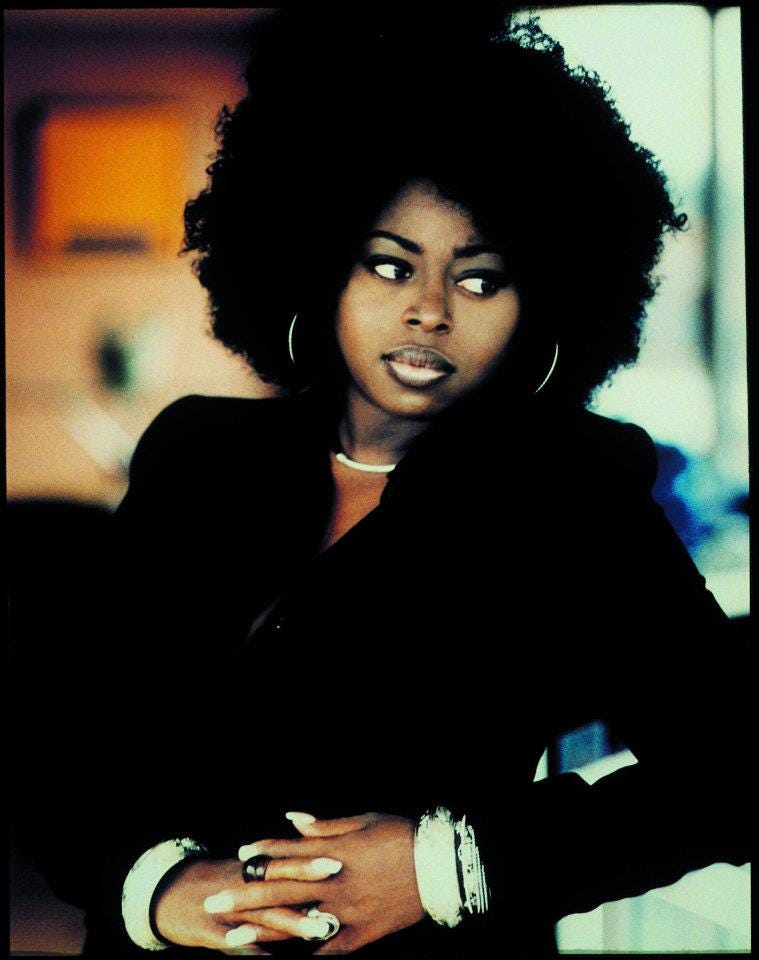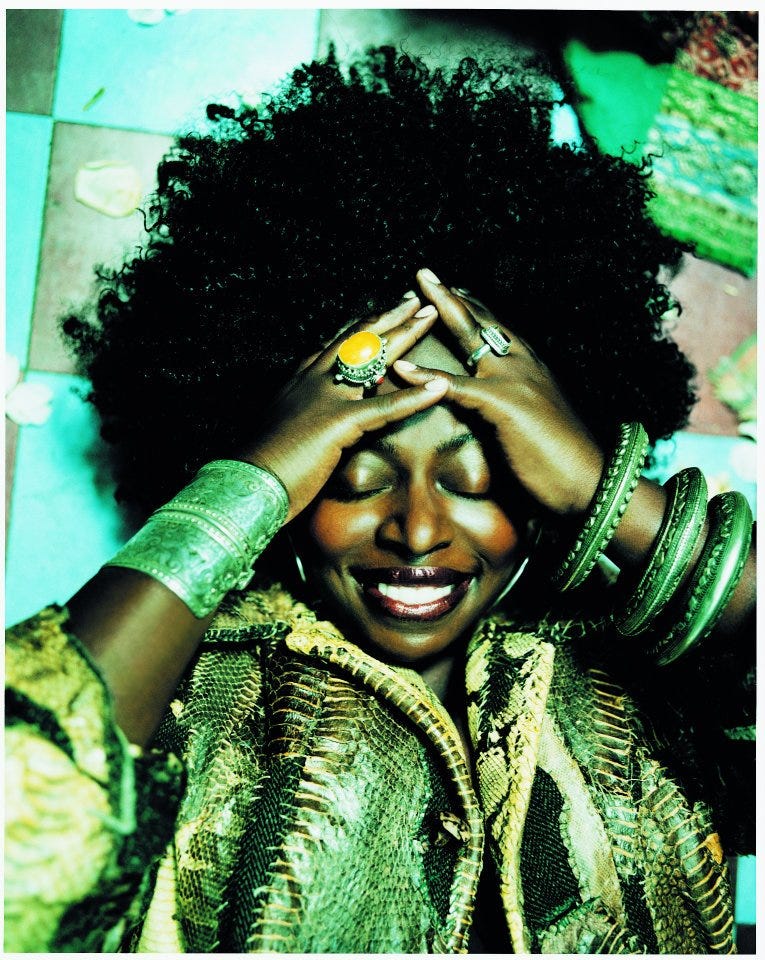Angie Stone Be Rappin’ & Singin’
Having at last released her debut album, Angie Stone spoke about her past activities—from her time with The Sequence to showcasing her vocal abilities in Vertical Hold and working with Gerry DeVoe.
Angie Stone has enjoyed a career spanning over 20 years, yet her long-awaited solo debut, Black Diamond, is an impressive statement. People sometimes ask, “Wasn’t she always known for rap?” But in reality, she drew widespread notice back in her days with The Sequence—an all-female rap group—while also being recognized as a singer. Eventually, she signed with Arista, and some might say her path took a meandering course to get where she is now. However, if you trace Angie’s steps in detail, you see she was always on a steady march. From the mid-‘80s to early ‘90s, she collaborated with everyone from (1) Sugarhill Presents The Sequence (‘80), The Sequence (‘82), The Sequence Party (‘83), and so on, releasing a string of albums that left their mark on rap history, including “Funk You Up.” After that, she also took part in “Monster Jam,” “Rapper’s Delight,” and “Cold Sweat.”
During the funk era, she covered a Parliament track, “Funky Sound (Tear the Roof Off),” while also taking on some rap covers that brought a sense of nostalgia for classic funk. Furthermore, with subsequent projects, Angie tackled everything from rootsy rock to B-flavored compositions. However, even when she dabbled in new jack swing, the skillful singing she demonstrated from that period stands out—like “Don’t Need Your Love.” In ‘87, she joined the group Vertical Hold. Their first album, A Matter of Time, came out in ‘93 on A&M; their second, Head First, in ‘95. Tracks like “Don’t Say Goodnight” and “Spend Some Time” show the growth of her musical style. Then, in ‘99, Angie Stone (solo) took off. She was also heavily featured as a guest vocalist in various sessions. By that point, she had built a reputation as a soulful singer with a distinctive presence. With “Money Talks,” “Everyday,” “Brown Sugar,” and more, she’s steadily expanded her repertoire.
Eventually, after hooking up with D’Angelo, she scored a major success. Even though her album soared in the UK, and people said, “Tell me more about Angie Stone!” it was around that time that the entire wave of neo-soul was washing in, and artists like Lauryn Hill were also making moves. That synergy likely boosted her presence further. “Devox featuring Angie B. Stone” was also part of that. She’d contributed as a singer in various forms. As a result, she built up the momentum to release her own album, establishing a strong place for herself. Now, with Black Diamond, she’s delivered a truly powerful statement in urban music. Having seen her from the rap side, you might think, “Really? She’s a singer?” But actually, from the start, she’s been capable of both. That’s the real Angie Stone—rappin’ & singin’—and she’s reached this point through two decades of steady work.
This conversation is translated and lightly edited for content and clarity, as follows below.
When you set your sights on going pro, did you want to become a rapper or a singer?
“A singer. I originally started as a singer, but when The Sequence was formed, rap got all the attention and before I knew it, people viewed me as a rapper. That’s the real story.”
Why did you begin rapping in the first place?
“Because of the people I hung out with. We had someone who was an engineer, and I was also close with Queen Latifah’s whole family. Even after The Sequence stopped its activities, as I continued to develop my singing, I began to hate being lumped into just one category as a rapper. I wanted to do both hip-hop and soul.”
In the early days, were there female groups you admired in the ‘80s, such as female vocal groups?
“Of course, I admired them. I listened to a lot of them. ‘How far did I dream of going?’ you ask… Well, if we’re talking about when I was with The Sequence, we were just so excited to be a part of it, though in my heart I always thought, ‘But I’m really a singer.’ Yet since we started out as a rap group, I did a lot of performing as a rapper.”
Then you eventually released a solo album, and then performed as a solo artist, right? Angie Stone finally standing on her own. Actually, you’ve been working for 20 years, but does it feel like it’s taken this long to make your solo debut?
“Yes, I’d say so. I parted ways with the label at times, or I’d switch management, so it was hard to release a CD. Those things all added up.”
First, I want to ask about the trajectory of your career. In the early ‘80s, you were active as a member of the female rap group The Sequence, right?
“Yes. That was the moment. In my personal sense, the vibe I got from them was ‘How about we do a female hip-hop group?’ And I said, ‘About how long do you think we’ll keep at it?’ (laughs). I just went along with it, but at that time I was also working on my craft as a singer.”
So, from The Sequence you moved on to Vertical Hold, continuing in a variety of ways. You also collaborated with Gerry DeVoe and others. Meanwhile, how did you come to work with Jeri/Jelly (sp?)—the name you mentioned just now—like Jilly Jones?
“Well, Vertical Hold was a group I participated in. We had all kinds of ideas, including from DeVoe, and we tried out different things—some with Devayne, Bright, etc. (possibly a reference to producers). We had the same perspective on music, so we teamed up. We said, ‘Let’s make it happen together.’”
Was Vertical Hold your group or were you more of a solo act?
“It was a group, but we all shared ideas. That’s how I eventually got to know DeVoe, Bright, and others (laughs). Later on, we all produced songs under the same roof. We’d say, ‘Let’s do it this way!’ That’s what got me started in production as well.”
Were you producing your own music then?
“Yes, I was in charge of my own recordings. I produced tracks, oversaw the arrangements, and basically wore a lot of hats myself. That’s partly because, originally, I wanted to make the best use of my own style. I’d already done a lot of writing, releasing, and performing with The Sequence and Vertical Hold. That was my job. Meanwhile, I also knocked on doors to break into new styles and push my music. We had some synergy with The Sequence, and after that, I worked with Vertical Hold and, then, on top of that, with Jeri DeVoe. So all of those experiences shaped who I am.”
Devox feat. Angie B. Stone was released in America but not in Japan. What happened with that?
“Yes, that album was a personal project. It had a style I really wanted to put out, combining hip-hop and R&B with a new twist. The Sequence was very party-oriented, and Vertical Hold came after that, so it was my job then. But in America, there were various core fans who’d pick up that kind of music—P-Funk, Parliament, or strong R&B albums, etc. Some people were more into the hardcore style. But you know, not everyone is into that. Some only like certain vibes. That’s why it’s difficult to market certain albums in the U.S., and they don’t always get picked up.”
You were born and raised in South Carolina, right? Did you move to New York when you were around 10 years old?
“I’ve been going to New York since I was about 20. I do have an interest in East Coast music. (laughs) But I wouldn’t say that’s the only place I’ve lived. Actually, my father was a pastor, so from an early age, I grew up immersed in gospel music, which made me who I am today.”
Which labels have you been with?
“I was on LeFace, Clive Davis’s label, and after that, I went to Arista and then to private deals, so I was involved with a variety of folks. Every label and partnership had something different going on.”
In terms of your musical style, you’ve done disco, hip-hop, gospel, R&B, and so on. You sing, you rap... You’ve never been confined to any one thing, right?
“Exactly. As I continued to develop my vocal abilities, I grew tired of being shoved into a single category as a ‘rapper.’ I like to perform everything from quiet ballads to energetic dance music. As an artist, it was important for me to have a multifaceted approach. That’s how I see it—like a swirl of multiple ingredients that come together to form my music.”
So after The Sequence and Vertical Hold, you also collaborated with Gerry DeVoe. Could you talk about your role?
“I was basically self-producing. I took on that role. I also played the role of engineer on some tracks. Meanwhile, there were times I’d give the tracks to other producers and see what they’d do with them, or times I’d keep them for myself. Then I’d do it my way. I tried different things. While I was working on that, I got to know people like D’Angelo and a number of guest producers, so I ended up deciding, ‘All right, I’ll go with this!’ That’s how it happened.”
This is your first time with the neo-soul approach, right?
“Why? Because I’m a veteran, but this is my first time fully stepping out as a solo project in that New York scene. Even if you say I’d already come on the scene before, for instance, with The Sequence, that was so long ago, right? Plus, for a while, I was more behind the scenes as a producer, or I’d appear as a guest. So, it’s fair to say that this album is my first real foray as a fully solo artist. (And I chose the producer who worked on it, too.)”
Who was that?
“Ali Shaheed, Evil E, and D’Angelo. I’m hearing those names a lot these days, right? Because I’m also a producer—and I wanted to produce as well as write. (I’ve always been writing, after all.) There are times I might produce a track myself or times I might let a guest producer handle it. As for the rest, if the vibe is there, I’ll add my own rap. That’s how I’ve worked all this time.”
About sampling old tracks for your album: you draw from the music scene of the ’70s, right? It feels like you’re bridging older music with more modern sounds.
“Production is about weaving in elements of disco, rap, soul, and so on, all while putting out my new music. I love the music of the ’70s, so I take advantage of it. That entire era’s vibe is still present in music today, and I think it’s something we can build on and expand further. That’s how I see it. When it comes to hooking a listener, older tracks can be really effective. I enjoy that approach.”
The Japanese edition includes bonus tracks. There’s a track titled “Honest.” What is that about?
“I like it. For me, ‘Life Story’ and ‘Without You’ are also favorites. They’re that kind of soulful vibe. Speaking of which, it’s been a long time since I’ve released a real album. I’m thrilled that I got to do it. I definitely want Japanese listeners to check it out. And if I can, I’d love to come perform in Japan soon. Because, you know, I also want to meet the fans and connect with them directly.”
Finally, is there anything else you’d like to say to your fans in Japan?
“I’m a very spiritual person, so I always put my soul into my singing.”



